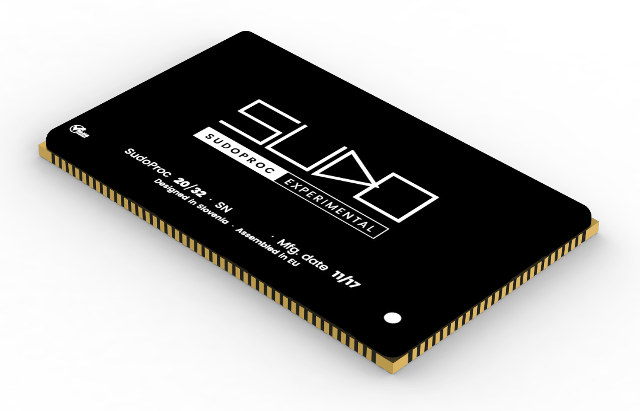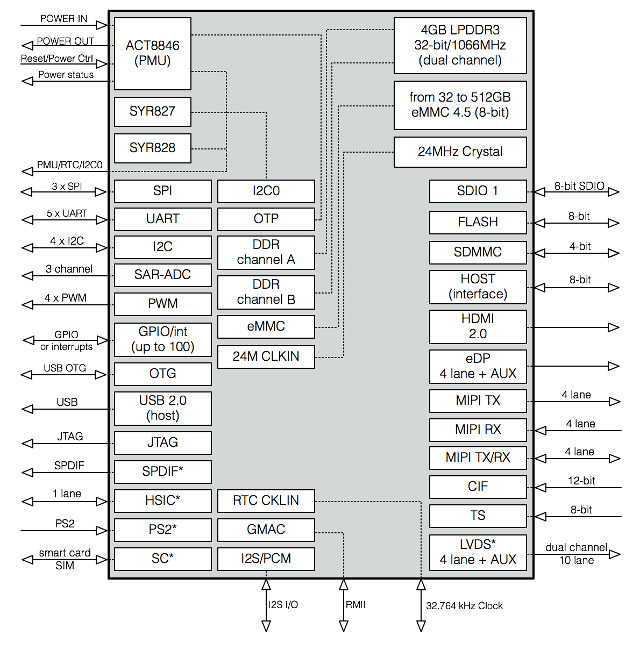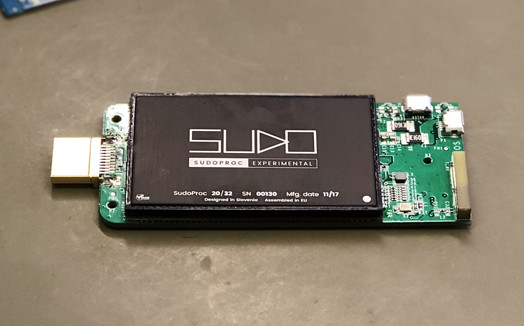Most systems-on-module are designed to be inserted into a baseboard thanks to an edge connectors or one or more board-to-board connectors, although I’ve also seen some with castellated pins allowing them to be soldered to the carrier board.
The guys at Sudo Systems LLC have taken a different approach as they went with a custom designed 210-pin LGA (Land grid array) module instead, which is based on Rockchip RK3288 processor, and extremely compact at 65 x 40 x 4.3 mm.

SudoProc module specifications:
- SoC – Rockchip RK3288 quad core Cortex-A17 processor @ up to 1.8 GHz with Arm Mali-T764 GPU
- System Memory – 4GB LPDDR3 (Samsung) @ 1066MHz; 2 x 32 bit, dual channel
- Video Decoding – H.264 decoder @ 2160p@24fps, H.265 decoder @2160p@30fps, and H.264/MVC/VP8 encoder 1080p@30fps
- Storage – 32GB, 64GB, 128GB, 256GB or 512GB eMMC 4.5 flash
- LGA package with 210 pins exposing:
- Storage I/F – 8-bit NAND flash I/F, 4-bit SDMMC 3.0
- Video I/O
- eDP 1.3 @ up to 4K x 2K @ 30fps
- HDMI 1.4 / 2.0 up to @ 1080p @ 120 Hz and 4k x 2k @ 60 Hz
- Optional single & dual channel LVDS with 10 data lanes in total
- MIPI 0 TX, MIPI 1 RX and TX, MIPI 2 RX, 4 data lane, up to 4Gbps, up to 1080p @ 60fps output
- 8-bit BT656(PAL/NTSC) interface
- 16-bit BT601 DDR interface
- 8bits/10bits/12bits raw data interface
- Maximum input resolution 14M(4416×3312) pixels
- Audio I/O
- Up to 8-ch I2S (4xTX, 2xRX), 16-bit to 32-bit audio resolution, sample rate up to 192KHz
- optional S/PDIF
- Connectivity – Gigabit Ethernet
- USB – USB 2.0 host, USB 2.0 OTG, optional HSIC 2.0 interface
- Other I/Os
- 4-bit SDIO interface
- 3x SPI master or slave
- 5x UART asynchronous (3 with flow control) up to 4 Mbps
- 5x I2C multi-master operation up to 400Kbit/s
- 3x 10-bit SAR-ADC up to 1 MSPS (0V to 1.8V)
- GPS interface complete 1-band, C/A, and NMEA-0183 compatibility
- Host interface – 8 inputs/16 outputs or 16 inputs/8 outputs
- optional PS2 interface
- optional Smart card interface
- TS interface with support for 2 built-in PTIs
- 4x 32-bit timer/counter PWM (with interrupt)
- Up to 100x GPIOs (all can be used as interrupt)
- Security – AES up to 256bit, DES and TDES, SHA-1 to SHA-512, PKA from 128 bit to 3136 bit, Cortex-A12/A17 security mode: TZMA and TZPC; 2x eFUSE
- Power Supply
- 5V (±10%) up to 3A
- ACT8846 PMIC
- I/O operation range – 3.3V or 2.5V or 1.8V (±10%), depending on the port
- Dimensions / Footprint – 65 x 40 x 4.3 mm; custom LGA210 footprint
- Temperature Range – -25°C to +85°C (Additional heatsink is not required with proper PCB thermal design)

LGA packages have been traditionally found in x86 processors so you could insert them into sockets, and easily replace or upgrade the installed one with a compatible processor, and while in theory the LGA210 package could be inserted into a socket, SudoProc modules relies on a custom design, so there’s no corresponding LGA210 socket for sale on the market, and instead the module will have to be soldered to be baseboard/carrier board.
On the software side, SudoProc modules come with a pre-installed in-house SudoOS operational systemm based on Linux, and best used for single app solutions and bringing up a new board. The company also shows icon for Android, Ubuntu, Debian, the Yocto Project, and Qt, but it’s unclear whether those are officially supported by the company.
 The module is shown above soldered on a HDMI TV stick, and Dejan Gajsek – who appears to be the public face of the company – mentioned “it’s perfect for multimedia devices, autonomous driving and IoT”. The module is fitted with an aluminum heatsink which should help with cooling, but despite the company’s claim I’m not convince this will be sufficient in all cases, especially if your application gets close to the 85°C ambient temperature limit.
The module is shown above soldered on a HDMI TV stick, and Dejan Gajsek – who appears to be the public face of the company – mentioned “it’s perfect for multimedia devices, autonomous driving and IoT”. The module is fitted with an aluminum heatsink which should help with cooling, but despite the company’s claim I’m not convince this will be sufficient in all cases, especially if your application gets close to the 85°C ambient temperature limit.
SudoProc has already been launched according to a G+ post, with the design made in Slovenia, and manufacturing in Europe, but pricing is not publicly available. Further details can be found, and sample(s) request be made, on the product page.

Jean-Luc started CNX Software in 2010 as a part-time endeavor, before quitting his job as a software engineering manager, and starting to write daily news, and reviews full time later in 2011.
Support CNX Software! Donate via cryptocurrencies, become a Patron on Patreon, or purchase goods on Amazon or Aliexpress




